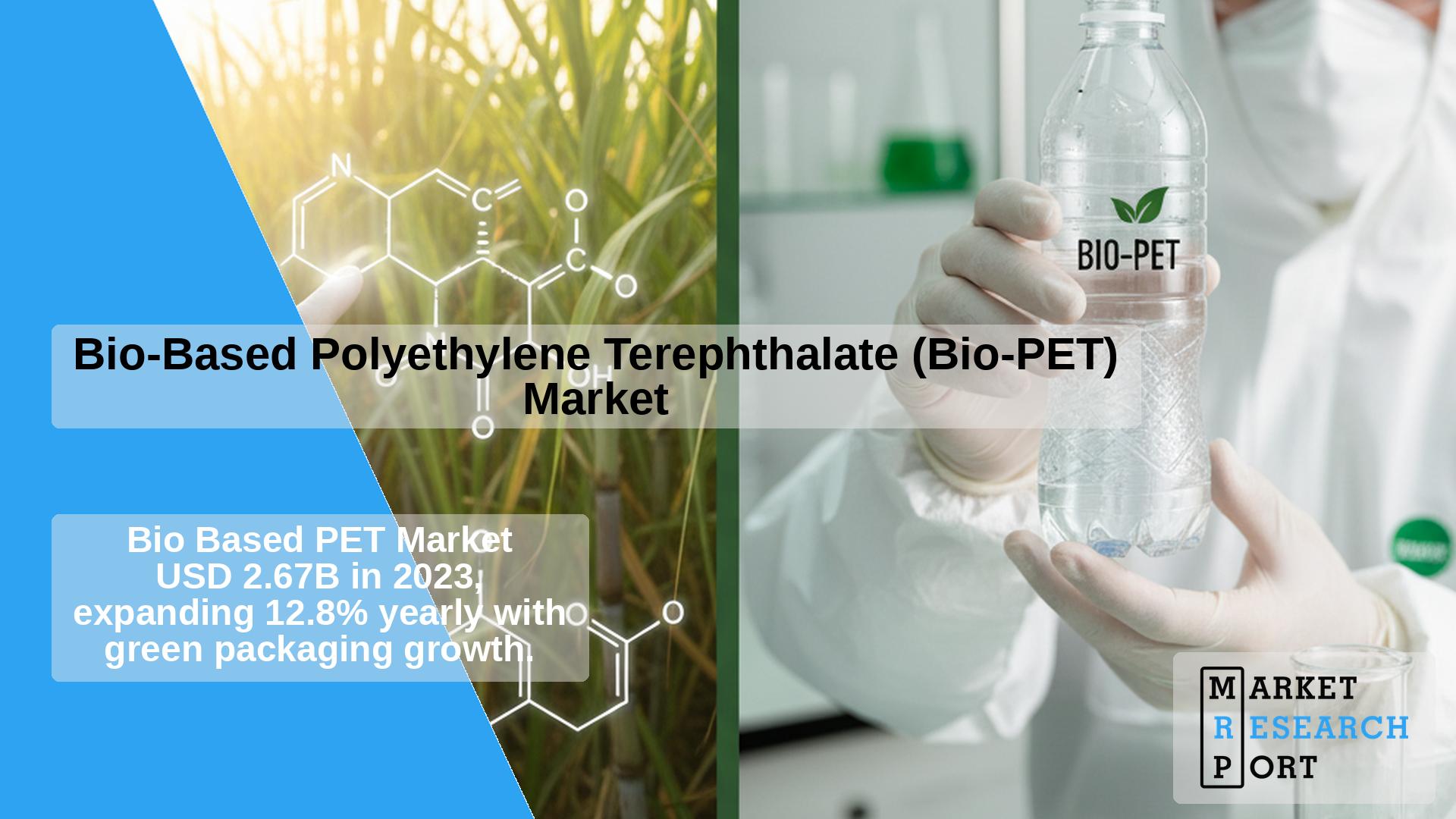
The global bio-based polyethylene terephthalate (Bio-PET) market was valued at approximately USD 2.67 billion in 2023 and is projected to grow at a compound annual growth rate (CAGR) of 12.8% from 2024 to 2030. The growth is largely driven by increasing environmental concerns related to greenhouse gas emissions and rising demand for sustainable plastic alternatives. Bio-PET is gaining momentum in various industries, particularly food and beverage packaging, while the shift towards renewable materials and eco-friendly products continues to expand market opportunities.
Derived from natural sources, Bio-PET is used in producing packaging, plastic bottles, electrical and electronic components, among other applications. It offers similar durability, transparency, and shatter resistance as traditional petroleum-based PET but with the added benefits of sustainability and biodegradability. These attributes reduce pollution and help manufacturers shift from non-degradable packaging towards environmentally responsible disposables, thereby propelling market growth.
The ongoing high demand for plastics across industries underlines the importance of bio-based options like Bio-PET, which is a drop-in bioplastic compatible with recycling systems. Consumer awareness about waste management and the harmful effects of traditional plastics also encourages manufacturers to adopt Bio-PET for diverse applications.
The bottle segment dominated the Bio-PET market with a revenue share of 53.9% in 2023. The demand for bottle packaging is driven by FMCG, food, beverage, and personal care sectors seeking sustainable alternatives to conventional PET bottles. Bio-PET bottles are favored for their low carbon footprint, chemical resistance, and transparency. With increasing environmental regulations and growing global food and beverage markets, the demand for bio-based bottles is expected to accelerate.
The foam segment is forecasted to grow at a CAGR of 14.7% over the next several years. Bio-based foam products have gained importance due to their lightweight, cushioning properties, and use in industries such as sports equipment, aerospace, automotive, and construction for thermal insulation and protective packaging. Environmental concerns related to synthetic polymer-based foams, including pollution and greenhouse gas emissions, also promote the adoption of bio-based foams derived from Bio-PET.
The bio-based PET market in North America is expected to exhibit significant growth driven by strong industrial demand and stringent government regulations promoting biodegradable materials and reduced emissions. Continuous R&D investments and technology improvements enable wider adoption of bio-based PET products in the region.
The U.S. market is anticipated to grow robustly, supported by lifestyle shifts, increasing disposable incomes, and a rising working population. The demand for packaged foods and beverages, along with the need for improved packaging solutions, boosts the bio-based PET market.
Asia Pacific held the largest market share of 39.6% in 2023 and continues to lead due to growing industrialization, strict environmental laws, and prominent manufacturers in countries like China, Japan, and India.
China drives the Asia Pacific market with significant demand from packaging industries and consumers preferring eco-friendly plastic products. Strong automotive sector growth also supports market expansion.
Latin America is projected to grow at a CAGR of 14.3%, fueled by rising consumer awareness about plastic pollution and regulatory measures encouraging sustainable packaging. Economic development also supports adoption in automotive and packaging industries.
Europe’s market growth is influenced by demand for lightweight, durable, and sustainable products, especially in automotive and consumer goods. Countries like the UK show strong demand driven by sectors such as construction, agriculture, and electronics adopting bio-based PET material.
Prominent market participants include The Coca-Cola Company, Danone India, Indorama Ventures Public Company Limited, TORAY INDUSTRIES, INC., Mitsubishi Chemical Group Corporation, PepsiCo, Plastipak Holdings, Inc., TEIJIN LIMITED, Toyota Tsusho Corporation, and others. These companies focus on developing innovative and sustainable packaging and plastic solutions.
| Report Attribute | Details |
| Market size (2024) | USD 3.00 billion |
| Revenue forecast (2030) | USD 6.16 billion |
| Growth rate (CAGR) | 12.8% (2024-2030) |
| Base year | 2023 |
| Historical data period | 2018-2022 |
| Forecast period | 2024-2030 |
| Units of measurement | Revenue in USD million |
| Coverage | Revenue forecast, key players, competitive landscape, growth factors, and trends |
| Segments | Application, Region |
| Regions Covered | North America, Europe, Asia Pacific, Latin America, Middle East & Africa |
| Countries Covered | U.S., Canada, Mexico, UK, Germany, France, Italy, Spain, Russia, Denmark, Sweden, Norway, China, India, Japan, South Korea, Australia, Thailand, Indonesia, Vietnam, Brazil, Argentina, Saudi Arabia, UAE, Kuwait |
| Key Companies | The Coca-Cola Company., Danone India., Indorama Ventures Public Company Limited., MG Chemicals, Mitsubishi Chemical Group Corporation., PepsiCo, Plastipak Holdings, Inc., TEIJIN LIMITED., TORAY INDUSTRIES, INC., Toyota Tsusho Corporation., VIRENT, INC., Anellotech, Inc., Gevo, Inc., Avantium N.V. |